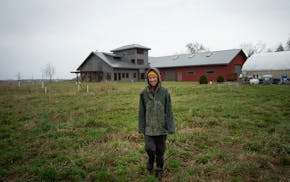Twin Cities apartment developers are filling units nearly as fast they can build them.
Although more than 3,000 new apartments were built in the metro area over the past year, the average vacancy rate barely budged, ending the year at just 2.5 percent, with average monthly rent rising 2.5 percent to $981, according to Marquette Advisors.
"It was another outstanding year to be an apartment owner in the Twin Cities, but if you're a renter you had to move quickly if you saw something you liked," said Jack Sipes, senior vice president of property management for Dominium, which owns and manages more than 5,000 apartments in the Twin Cities and more than 23,000 units nationwide.
With the economy on the mend and housing in short supply, the Twin Cities has consistently rated as one of the nation's tightest rental markets. That demand is being driven by an influx of renters from outside the area who are moving here for jobs and by an increase in the number of renters by choice. In addition, there has been a dearth of new apartment construction for much of the past two decades.
"This is a very strong apartment market, probably our strongest across the country," said Sipes. "When we have a vacancy, we lease quickly at or above what the person before was paying."
The report, which surveys more than 110,000 apartments in mostly large complexes across the metro area, shows that the rental market is especially tight for low- and moderate-income renters.
All eyes, however, are on downtown Minneapolis, which has been the epicenter of a recent building boom. Across the region, more than 3,100 new units were built last year, half of them in downtown.
The abundance of new projects, mostly high-end buildings where a studio apartment can easily rent for more than $1,000 a month, has created growing concern that the market is overbuilt and headed toward saturation. While the average downtown vacancy rate doubled to 4 percent at the end of 2013, the market is expected to easily absorb the 1,200 additional units that will come online this year.
"We were impressed by the sustained level of demand, especially in and around downtown and given the amount of new product that came online," said Brent Wittenberg, vice president at Marquette advisers.
In downtown, monthly average rents rose by 9.1 percent to $1,402, largely because of a statistical shift caused by a dramatic increase in the number of expensive units that came to market last year, including the Soo Line Building City Apartments and the Brunsfield North Loop.
Much of this development has been fueled by renters who are new to the Twin Cities, mostly those who are moving for their jobs. The Minnesota Department of Employment and Economic Development said the Twin Cities added 34,900 jobs last year following the addition of 33,000 in 2012.
In the coming year, Wittenberg expects vacancy rates downtown to increase slightly as several large buildings come to market at the same time, including the Nic on Fifth in downtown Minneapolis and the LPM Apartments near Loring Park, but he's not concerned about overbuilding.
Already, fewer new buildings are being proposed, suggesting that the rapid pace of development will soon slow, according to Mary Bujold, president of Maxfield Research. "We are starting to see more proposals for areas outside of downtown Minneapolis and Uptown," she said.
Competition for rentals is expected to become particularly fierce in first- and second-tier suburbs, especially in parts of the region with easy access to public transportation, shops and restaurants. In Blaine, for example, the average vacancy rate fell to just 1 percent with the average rents rising 11 percent. And in Eagan, where at least three developers have recently stepped forward with plans for new apartment buildings, the vacancy rate fell to just 1.4 percent.
"This market has been pretty solid the last two years with really no apartment development," said Lisa Moe, president and chief executive officer of StuartCo, which owns a 200-unit property in Eagan called Woodridge Apartments.
Jim Buchta • 612-673-7376
Police make arrests a year after theft of gold and cash worth millions at Toronto's Pearson airport
Retired general's testimony links private contractor to Abu Ghraib abuses

